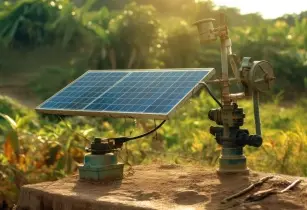A new study published in Environmental Research Letters, reveals that solar powered irrigation systems have the potential to meet more than a third of the water needs for crops across small scale farms in sub-Saharan Africa
As part of the research project Renewables for African Agriculture (RE4AFAGRI) in a new study led by the International Institute for Applied Systems Analysis (IIASA), an international research team developed an open-source modelling framework that used various datasets pertaining to agriculture, water, energy, expenses, and infrastructure. The purpose of this framework was to calculate local irrigation needs, determine the necessary size and cost of technology components like water pumps, solar PV modules, batteries, and irrigation systems, and assess the economic prospects and sustainable development impacts of adopting solar pumps.
Giacomo Falchetta, lead author of the study and a researcher in the Integrated Assessment and Climate Change Research Group of the IIASA Energy, Climate, and Environment Programme explained that an average discounted investment of US$3bn would be required annually, increasing yields of smallholder farmers and resulting in annual profits amounting to more than US$5bn. Additional co-benefits would include significant food security and energy access. “Reducing the irrigation gap with cost-effective solar pumps can boost food production and improve nutrition, contributing to SDG 2 (Zero Hunger). Furthermore, surplus electricity generated by these systems could serve other energy needs, aligning with SDG 7 (Affordable and Clean Energy),” said Falchetta.
IIASA Transformative Institutional and Social Solutions Research Group leader, Shonali Pachauri also pointed out one of the important highlights of the study, emphasising the importance of strong land and water resource management infrastructure and governance, without which a widespread deployment of solar pumps may drive an unsustainable exploitation of water sources and reduce environmental flows. "Consequently, both investing in infrastructure, such as reservoirs for water management during seasonal variations, and enhancing water resource governance, are critical factors for ensuring the sustainability of widespread solar pump deployment,” noted Pachauri.
Overall, the analysis along with the novel open-source modelling framework can support public and private actors working along the water-energy-food-economy nexus in identifying economically feasible areas and quantifying the potential net economic benefit of developing solar irrigation, all of which can help foster investment in the sector.
For more information, visit: https://iiasa.ac.at/





